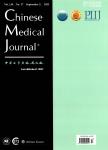Construction and evaluation of the functional polygenic risk score for gastric cancer in a prospective cohort of the European population
Construction and evaluation of the functional polygenic risk score for gastric cancer in a prospective cohort of the European population作者机构:Department of EpidemiologySchool of Public HealthSoutheast UniversityNanjingJiangsu 210009China Department of EpidemiologyCenter for Global HealthSchool of Public HealthNanjing Medical UniversityNanjingJiangsu 211166China Jiangsu Key Lab of Cancer BiomarkersPrevention and TreatmentCollaborative Innovation Center for Cancer Personalized Medicine and China International Cooperation Center for Environment and Human HealthNanjing Medical UniversityNanjingJiangsu 211166China Jiangsu Key Laboratory of Molecular and Translational Cancer ResearchJiangsu Cancer HospitalJiangsu Institute of Cancer ResearchThe Affiliated Cancer Hospital of Nanjing Medical UniversityNanjingJiangsu 210009China
出 版 物:《Chinese Medical Journal》 (中华医学杂志(英文版))
年 卷 期:2023年第136卷第14期
页 面:1671-1679页
核心收录:
学科分类:1002[医学-临床医学] 100214[医学-肿瘤学] 10[医学]
基 金:supported by grants from the National Natural Science Foundation of China(Nos.82125033,82230110,81872702,82003534,and 82273714) the Natural Science Foundation of Jiangsu Province(No.BK20200674) CAMS Innovation Fund for Medical Sciences(No.2019RU038).
主 题:Polygenic risk score Gastric cancer Polymorphism,single nucleotide Cross ancestry
摘 要:Background:A polygenic risk score(PRS)derived from 112 single-nucleotide polymorphisms(SNPs)for gastric cancer has been reported in Chinese populations(PRS-112).However,its performance in other populations is unknown.A functional PRS(fPRS)using functional SNPs(fSNPs)may improve the generalizability of the PRS across populations with distinct ethnicities.Methods:We performed functional annotations on SNPs in strong linkage disequilibrium(LD)with the 112 previously reported SNPs to identify fSNPs that affect protein-coding or transcriptional regulation.Subsequently,we constructed an fPRS based on the fSNPs by using the LDpred2-infinitesimal model and then analyzed the performance of the PRS-112 and fPRS in the risk prediction of gastric cancer in 457,521 European participants of the UK Biobank cohort.Finally,the performance of the fPRS in combination with lifestyle factors were evaluated in predicting the risk of gastric cancer.Results:During 4,582,045 person-years of follow-up with a total of 623 incident gastric cancer cases,we found no significant association between the PRS-112 and gastric cancer risk in the European population(hazard ratio[HR]=1.00[95%confidence interval(CI)0.93–1.09],P=0.846).We identified 125 fSNPs,including seven deleterious protein-coding SNPs and 118 regulatory non-coding SNPs,and used them to construct the fPRS-125.Our result showed that the fPRS-125 was significantly associated with gastric cancer risk(HR=1.11[95%CI,1.03–1.20],P=0.009).Compared to participants with a low fPRS-125(bottom quintile),those with a high fPRS-125(top quintile)had a higher risk of incident gastric cancer(HR=1.43[95%CI,1.12–1.84],P=0.005).Moreover,we observed that participants with both an unfavorable lifestyle and a high genetic risk had the highest risk of incident gastric cancer(HR=4.99[95%CI,1.55–16.10],P=0.007)compared to those with both a favorable lifestyle and a low genetic risk.Conclusion:These results indicate that the fPRS-125 derived from fSNPs may act as an indicator to measure the genetic risk of gastric cancer in the European population.



